Home Tags Posts tagged with "cuba"
cuba
Panama has charged the crew of the seized North Korean ship after it was found to be carrying Cuban weapons.
Prosecutor Javier Caraballo accused the 35 crew members of endangering public security by illegally transporting war material.
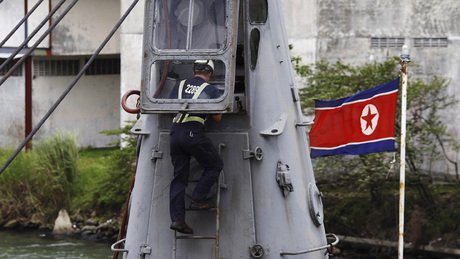
Panama has charged the crew of the seized North Korean ship after it was found to be carrying Cuban weapons
The charges came just hours after North Korea urged Panama to release the ship and its crew without delay.
Police found the weapons under bags of sugar. Cuba has said it had sent the weapons for repairs to North Korea.
Panama has asked the UN to investigate whether there has been a breach of sanctions against North Korea.
The UN sanctions prohibit the supply of arms to Pyongyang in the dispute over its controversial nuclear programme.
[youtube idY2-CWFHsc]
Two US lawmakers from Florida are demanding to know if the government sanctioned Beyoncé and Jay-Z’s vacation to Cuba.
Ileana Ros-Lehtinen and Mario Diaz-Balart have contacted the Office of Foreign Assets Control at the Treasury Department, asking if Beyoncé and Jay-Z obtained the correct license to travel to Cuba.
Angered by pictures showing Beyoncé and Jay-Z flaunting their retreat to the communist country, the legislators are criticizing the couple for indirectly supporting the oppressive regime of Raúl Castro by splashing as much as millions of dollars for luxurious accommodations for their entourage of family, friends and security.
A report in The Caribbean Journal said the two members of Congress have written to the director of the US Office of Foreign Assets Control (OFAC).

Two US lawmakers from Florida are demanding to know if the government sanctioned Beyoncé and Jay-Z’s vacation to Cuba
Ileana Ros-Lehtinen and Mario Diaz-Balart, who have openly criticized the repressive government in Cuba, are inquiring after the type of license Beyoncé and Jay-Z obtained to enter Cuba.
“We would like to respectfully request, within all applicable rules and guidelines, information regarding the type of license that Beyoncé and Jay-Z received, for what purpose, and who approved such travel,” the lawmakers stated in their letter.
“If these individuals were given people-to-people licenses, we would like to bring to your attention the Cuba Travel Advisory issued by OFAC on July 25, 2011 which states, <<OFAC only licenses People-to-People Groups that certify that all participants will have a full-time schedule of educational exchange activities that will result in meaningful interaction between the travelers and individuals in Cuba>>,” they added.
According to a description of the license on the agency’s website: “OFAC does not authorize transactions related to activities that are primarily tourist-oriented, including self-directed educational activities that are intended only for personal enrichment.”
Beyoncé and Jay-Z’s trip coincides with the news that a Cuban editor, Roberto Zurbano, was fired from his post at publishing house because of an article he wrote that claimed the country had a history of discriminating against blacks.
Roberto Zurbano had mentioned the discrimination in an op-ed piece for the New York Times, For Blacks in Cuba, the Revolution Hasn’t Begun, published on March 23.
On Friday, The Havana Times reported that Roberto Zurbano told his colleagues that he had been dismissed from the publishing house of the Casa de las Americas cultural center, in the wake of the article.
Pictures showing Beyoncé and Jay-Z sauntering down a street in Havana, Cuba and taking in the island’s nightlife have sparked outrage among activists appalled that the couple could vacation in a country known for its oppressive regime.
Beyoncé and Jay-Z took a jaunt to Cuba this week to celebrate their 5th wedding anniversary but many wonder why they decided on a place known for extreme poverty and repression of political dissidents.
On Friday, the couple were pictured at the University of Arts in Havana and posed for pictures with students.
It was not reported if Beyoncé and Jay-Z participated in any classes nor were details provided about the visit.
Beyoncé, 31, even sang, though she was technically lip synching, the national anthem at Barack Obama’s 2013 inauguration and for his 2009 inauguration she sang while the president danced with First Lady Michelle Obama at a ball during the celebration.
Since the jet-setters have politically tied themselves to the 44th president and could literally select any location in the world to travel, why would they decide on such a controversial destination?
The US State Department classifies Cuba as “an authoritarian state that routinely employs repressive methods against internal dissent” and does not have diplomatic relations with the government, now lead by Fidel Castro’s brother Raúl.
The vacation has left one human rights activist in a state of disbelief.
“There are women getting beaten on a daily basis, women who are jailed for no reason…people are fighting for their freedom. It’s extremely insensitive,” Mauricio Claver-Carone, from the U.S.- Cuban Democracy Political Action Committee, told TMZ.
Washington’s 51-year embargo makes it illegal for US citizens to visit Cuba for mere tourism, although tens of thousands of Americans travel there each year on academic, religious, journalistic or cultural exchange visas.
The Obama administration eased many of the restrictions in 2011, but tourists still need a special visa to visit Cuba.
[youtube 1PqZqtZ-YOQ]
Cuban police were called to keep the crowds at bay after Beyonce and husband Jay-Z were mobbed in Havana.
Beyonce and Jay-Z were celebrating their 5th wedding anniversary in Havana when they were surrounded by dozens of well-wishers.
The law enforcement officers arrived at the renowned restaurant La Guarida on Wednesday night.
Their bodyguards’ presence outside set the gritty, bustling neighborhood of Centre Havana abuzz, and a crowd gathered downstairs shouting Beyonce’s name until she went to a balcony and waved.
Waitress Silvia Fernandez said Beyonce toured the eatery and looked at photos of past celebrity clients including Jack Nicholson, Jodie Foster, Danny Glover, Will Smith and James Belushi.
“She was beautiful, without a drop of makeup, very natural,” Silvia Fernandez said.
“What happened with the people was incredible.”

Beyonce and Jay-Z were celebrating their 5th wedding anniversary in Havana when they were surrounded by dozens of well-wishers
Police arrived and made sure Beyonce was able to exit without incident.
Beyonce, 31, cut a striking image, with her hair styled into cornrows.
She was wearing a patterned yellow ensemble which showed off her legs while rapper Jay-Z, 43, looked like the quintessential tourist in shorts, a blue T-shirt and hat.
La Guarida staffers showed The Associated Press pictures of the two dining on typical Cuban creole favourites – fish, chicken, black beans and rice – accompanied by their mothers.
The privately run restaurant is famous as the filming location for the hit movie Strawberry and Chocolate, and is a mainstay on Havana’s tourist circuit.
Beyonce and Jay-Z – who married in Paris on April 4, 2008 – toured colonial Old Havana wearing dark glasses and were surrounded by bodyguards and excited fans.
She posed for pictures with local schoolchildren while Jay-Z puffed on a Cuban cigar, and then they popped into another restaurant that boasts a rooftop terrace with a sweeping view of the harbour.
Beyonce and Jay-Z declined to speak to reporters, and it was not clear why they travelled to Cuba. State-run website CubaSi called it a tourist trip.
Washington’s 51-year embargo makes it illegal for US citizens to visit Cuba for mere tourism, although tens of thousands of Americans travel there each year on academic, religious, journalistic or cultural exchange visas.
The Obama administration eased many of the restrictions in 2011, but tourists still need a special visa or to be part of an organized tour.
In the past, artists who were challenged by the government have said they visited for cultural purposes.
[youtube Cib_9EF4kQM]
Cuba’s President Raul Castro has announced he will stand down at the end of his second term in 2018, following his re-election by the National Assembly.
Raul Castro, 81, formally assumed the presidency in 2008 – two years after replacing his ailing brother Fidel.
The Communist assembly, whose members ran for office unopposed, also chose Miguel Diaz-Canel Bermudez as Raul Castro’s first vice-president.
Miguel Diaz-Canel, 52, is widely seen as Raul Castro’s successor.
On Sunday, 86-year-old Fidel Castro – who was in power for five decades – made a rare public appearance at the opening session of the assembly in the capital Havana.
The Castros have been running Cuba under a one-party system since the 1959 revolution, which ousted the US-backed dictatorship of Fulgencio Batista.
Addressing the assembly following his re-election on Sunday, Raul Castro said: “This will be my last term.”
He had earlier called for a two-term limit and age caps for political offices, including the presidency.
But it is the first time he publicly said he would be stepping aside in 2018.
During his years in power, Raul Castro eased some restrictions on personal freedoms by lifting bans on mobile phones and home computers, and abolished the need of citizens to buy expensive exit visas when travelling abroad as tourists.

Cuba’s President Raul Castro has announced he will stand down at the end of his second term in 2018, following his re-election by the National Assembly
However, in his speech, he stressed: “I was not chosen to be president to restore capitalism to Cuba. I was elected to defend, maintain and continue to perfect socialism, not destroy it.”
Cuba has struggled economically since the collapse of the Soviet Union in the 1991 and now relies heavily on the support of the left-wing government of Venezuela.
Havana’s relationship with the US remains hostile – the two countries have no diplomatic relations and a decades-long American economic blockade is still in effect.
Until his promotion, Miguel Diaz-Canel was one of the eight vice-presidents on the council of ministers.
An electrical engineer by training, he rose through the Communist party ranks in the provinces and at one time served as education minister.
He would succeed Raul Castro if he is unable to serve his second full term in office.
Earlier in the day Raul Castro’s arrival, together with Fidel, and was warmly greeted by more than 600 assembly members.
Foreign press was barred from the opening ceremony.
Before Sunday, Fidel Castro was last seen in public earlier this month. Correspondents say he appeared frail and stooped at the time.
Fidel Castro has given up all his official positions, except his post as the assembly’s deputy leader.
[youtube JwMfwtxdNBo]
Venezuela’s President Hugo Chavez says he has returned home after receiving treatment for cancer in Cuba.
In three messages posted on Twitter, Hugo Chavez, 58, thanked Cuban President and ex-leader Raul and Fidel Castro.
Hugo Chavez also thanked Venezuelans for their support and said he would continue treatment in his home country.
He has been president for 14 years and was re-elected for another six-year term in October 2012, but his swearing-in was delayed because of his illness.
Hugo Chavez went to Havana for surgery on December 11, his fourth operation in an 18-month period for cancer first diagnosed in mid-2011.
Last week the first images of him since the operation were broadcast by Venezuela’s government.
Hugo Chavez was pictured smiling as he lay in bed reading a newspaper, with his two daughters by his side.

Hugo Chavez says he has returned to Venezuela after receiving treatment for cancer in Cuba
He announced his return to Venezuela to his 3.9 million Twitter followers in a series of tweets that were bombastic in tone but short on detail.
“We have arrived back in the land of Venezuela. Thank you Lord!! Thanks to my beloved people! We will continue our treatment here.”
There was no information about when or why he returned, and no details about whether he would actively take up the duties of office.
Instead Hugo Chavez thanked Cuba’s leaders and people and said he had confidence in his doctors.
“Onwards to victory!! We will live and we will overcome!!!” Hugo Chavez wrote in his final tweet.
The extent of Hugo Chavez’s illness is shrouded in mystery, but it is understood to be serious.
During his treatment the Venezuelan leader is reported to have had tumors removed from his pelvic region.
Hugo Chavez has also undergone prior rounds of chemotherapy and radiation treatment.
Though there have been few details about the president’s exact treatment, Vice-President Nicolas Maduro described it as “extremely complex and tough”.
[youtube tTyhJRVKM3M]
Former Cuban leader Fidel Castro has voted in country’s parliamentary elections, the first time the frail ex-leader has been seen in public for several months.
State TV showed Fidel Castro, 86, voting at a polling station where he is said to have spent up to an hour talking to other voters and the media.
He was stooped and spoke with a faint, weak voice.
A crowd surrounded his car, cheering as he was driven off, she adds.
All organized opposition is banned in Cuba and all candidates for elections have been selected by the ruling Communist Party or its affiliated associations.
More than 600 delegates will take their seats in the National Assembly and approve the candidates for Cuba’s key political positions.
With President Raul Castro – Fidel’s younger brother – already 81, Cubans are watching for any sign as to who might follow him.
The choice of vice-presidents and ministers could suggest who is being groomed to carry on the revolution.
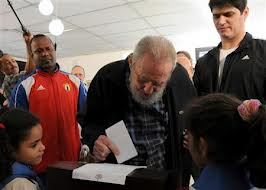
Former Cuban leader Fidel Castro has voted in country’s parliamentary elections, the first time the frail ex-leader has been seen in public for several months
[youtube Gpf0zVuWpcs]
Renesys monitoring experts have noticed that a high-speed fibre-optic cable connecting Cuba to the global internet appears to have finally been activated.
Cubans currently rely on satellite connections – which are expensive and slow – to get online.
But the cable, which has been in place since 2011, has shown the first signs of activity, Renesys said.
Curiously, researchers noted traffic via the cable seemed only to be flowing into the country, not out of it.
“In the past week, our global monitoring system has picked up indications that this cable has finally been activated, although in a rather curious way,” wrote Doug Madory, Renesys’ senior researcher.
He explained that in the past week it had been noted that Telefonica, the Spanish telecoms company, had begun appearing in their data for Cuba.
But Renesys’ data is a strong indicator that the cable is beginning to show signs of life – be it over five years since its original inception.

A high-speed fibre-optic cable connecting Cuba to the global internet appears to have finally been activated
A joint project between the state-owned telecommunications companies of both Venezuela and Cuba, the Alternative Bolivariana para los Pueblos de Nuestra America cable – known more succinctly as Alba-1 – had been hit by numerous delays before being completed in 2011.
But users were left in the dark as to why they were unable to get themselves hooked up to the connection, and were forced to make do with the high-latency connections provided by satellite.
But in the past week, much lower latencies – meaning faster connections – have been observed in the country, a strong indicator that the cable was now in use.
But Doug Madory stressed: “These aren’t exactly low latencies. Our measured latencies to Cuba are still quite high, albeit improved.
“The fact that the latencies to Cuba from many locations around the world have dropped below 480ms [milliseconds] means that the new Telefonica service cannot be entirely via satellite.
“However, if it were solely via submarine cables, we would expect latencies from many nearby countries to be less than 50ms.”
Doug Madory speculated that the activation of the cable may be a sign the country is becoming “freer and more open” – particularly as the cable first showed signs of activity on the same day as rules about exit visas were changed.
He went on to say that he did not believe there to be a China-style censorship firewall in place for Cuban internet users.
“In countries where we see latencies are impacted by censorship regimes, we often see a diurnal [daily] pattern in latencies,” he said.
“This is due to traffic slowing during busy times when everyone is awake and using the Internet, and the censorship software is struggling to keep up.
“When looking at the distributions of these [Cuban] latencies over time, I see no diurnal pattern.”
Despite the country’s lacklustre internet, an online community has taken shape in the recent years. Most notably, blogger Yoani Sanchez rose to fame as a dissident blogger who wrote about life in Cuba.
Yoani Sanchez used to email blog entries to friends outside of the country to publish online.
Her writing led to her being arrested in October last year as she prepared to cover the trial of politician Angel Carromero.
Hurricane Sandy has strengthened into a strong category two as it makes landfall in south-east Cuba.
The hurricane was carrying maximum sustained winds of 110 mph (175 km/h) as it hit land just west of Santiago de Cuba, said the US-based National Hurricane Center (NHC).
On Wednesday, one man was killed as Sandy swept over Jamaica.
A hurricane watch is in place in the Bahamas, and Florida has been placed on tropical storm watch.
The NHC said wind gusts of up to 114 mph had been reported in Santiago de Cuba.
It warned the hurricane was bringing heavy rain which could “produce life-threatening flash floods and mudslides, especially in areas of mountainous terrain”.
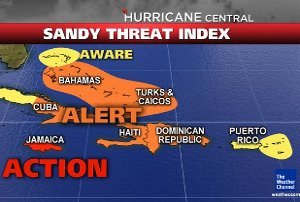
Hurricane Sandy has strengthened into a strong category two as it makes landfall in south-east Cuba
Local officials in Cuba said about 1,700 people had been evacuated as a precaution.
“We cannot put a single human life in danger. We must evacuate people in areas we know are likely to be flooded, without losing time,” defence official Lazaro Esposito told local media.
In Jamaica, more than 1,000 people sought refuge in shelters, with residents reporting widespread power outages, flooded streets and damages to buildings.
The authorities said one person, an elderly man, died when he was crushed by falling boulders as he tried to reach his home.
A 48-hour curfew has been imposed in all major towns, though some looting has been reported.
The country’s sole energy provider, the Jamaica Public Service Company, said earlier that 70% of its customers were without electricity.
[youtube bG1wAS97KnY]
Fidel Castro has appeared in public for the first time in months, refuting persistent rumors that he was gravely ill.
Staff at a top hotel in the capital, Havana, said Cuban revolutionary leader had dropped off a Venezuelan politician on Saturday.
Venezuelan ex-Vice-President Elias Jaua confirmed he had had a five-hour meeting with Fidel Castro, who is 86.
Speculation about Fidel Castro’s health has been constant since his brother Raul took over the presidency in 2006.
Elias Jaua told journalists gathered at the Hotel Nacional in Havana that Fidel Castro was “very well, very lucid”.
The Venezuelan politician, who served as vice-president until elections earlier this month, also showed a photograph of the encounter.
The last images of Fidel Castro to be made public had been from March, when the Cuban ex-leader briefly met Pope Benedict XVI during the pontiff’s visit to the Communist island.
Fidel Castro’s long absence from the public stage had fuelled rumors on social media sites that his health had deteriorated, or that he may even have died.
But Elias Jaua said the Cuban ex-leader was on good form.
“We talked for five hours about agriculture, history, international politics and, well, Fidel is doing fine,” he said.
Elias Jaua said Fidel Castro accompanied him to the Hotel Nacional after the meeting: “He had the courtesy of bringing me to the hotel.”
Hotel Director Antonio Martinez said he had found Fidel Castro “very happy, constantly smiling and talking about a lot of things”.
However, Fidel Castro did not personally cast his vote in the local elections which were held in Cuba on Sunday. Instead, he filled in his ballot paper at home, and it was delivered to a polling station on his behalf.
Fidel Castro led Cuba after the revolution in 1959, first as prime minister (1959-1976) and later as president.
In 2006, surgery took Fidel Castro out of public view. His brother Raul became acting president.
In February 2008, Fidel Castro officially handed over power to Raul who has been leading the country since then.
An improvised raft carrying 23 Cuban refugees has sunk as it approached Mexican island Isla Mujeres near the popular resort of Cancun.
Two people have died and 11 are missing and presumed dead.
Survivors told Mexican media that their home-made raft sank as it hit the reefs surrounding Isla Mujeres on Friday morning.
The refugees said they headed for Mexico in the hope of joining relatives in the United States.
The accident happened some 150 metres (140 yards) off Isla Mujeres, in an area known for its strong currents, the Mexican Navy said.
Ten Cuban refugees managed to swim to safety.
But they said the others were taken away by the currents or fatally injured as they were pushed towards the rocks by the big waves.
“One of them head a head injury and died on the beach. The other one, a woman, was taken to hospital but also died of her injuries,” said a Navy official, Ismael Gonzalez Gil.
There were no children among the 23 Cuban refugees.
The survivors said group’s intention was to reach the Mexican coast, which lies some 220 km (140 miles) west of Cuba, and eventually cross the border into the United States.
After almost 60 years, Coca-Cola is on sale again in Burma.
Coca-Cola is one of the world’s most recognized brands, so are there any countries where the drinks giant still remains unsold?
The company says it sells 1.8 billion servings of the drink every day. But for the last six decades, none has been in Burma.
That’s because of US trade sanctions on the military junta which ruled the country from 1962 to 2011.
Those sanctions were suspended a few months ago, as the country began to move towards democratic reforms.
But the company said on Monday its first delivery had arrived and local production would begin soon.
Coca-Cola’s entry into any country is a powerful symbol, says Tom Standage, author of A History of the World in Six Glasses.
“The moment Coca-Cola starts shipping is the moment you can say there might be real change going on here,” he says.
“Coca-Cola is the nearest thing to capitalism in a bottle.”

After almost 60 years, Coca-Cola is on sale again in Burma
Coca-Cola’s rival PepsiCo has also announced plans to resume sales in Burma.
There are now just two countries in the world where Coca-Cola cannot be bought or sold – Cuba and North Korea, both of which are under long-term US trade embargoes (Cuba since 1962 and North Korea since 1950).
Cuba was actually one of the first three countries outside the US to bottle Coke, in 1906.
But the company moved out as Fidel Castro’s government began seizing private assets in the 1960s, and has never returned.
In North Korea – the other Coca-Cola free zone – recent media reports suggested it was being sold in a restaurant in Pyongyang. But Coca-Cola says if any drinks are being sold there, they are being smuggled in on the black market, not via official channels.
The dark fizzy soda was created in 1886 in Atlanta, Georgia. From the early days the Coca-Cola company looked to expand worldwide, and by the early 1900s it was bottling the drink in Asia and Europe.
But the big boost came as a result of World War II when Coca-Cola was provided to US troops overseas.
There were more than 60 military bottling plants for Coca-Cola around the world during the war, and locals got a taste for the drink too.
It became powerfully associated with American patriotism, says Tom Standage, and was seen as so crucial to the war effort that it was exempted from sugar rationing.
Dwight Eisenhower, at the time the supreme commander of Allied forces in Europe, was said to be a particular fan and he ensured its availability in North Africa.
He also introduced the drink to top Soviet general, Georgy Zhukov, who asked if a special, colorless version – one that looked like vodka – could be made, and Coca-Cola duly obliged for a while, says Tom Standage.
These days Coca-Cola is regularly ranked as one of the top, if not the top, global brands.
“It has always been about the American dream,” says Bruce Webster, an independent branding consultant who has done work for the Coca-Cola company in the past.
But not all countries have embraced the American-ness that seems to be embodied by Coca-Cola.
It was the French who first coined the pejorative term “coca-colonisation” in the 1950s. Trucks were overturned and bottles smashed, says Tom Standage, as protesters saw the drink as a threat to French society.
During the Cold War, Coca-Cola became a symbol of capitalism and a faultline between capitalism and communism, says Bruce Webster.
It was not marketed in the former Soviet Union due to the fear that profits would go straight into communist government coffers, says Tom Standage.
Pepsi filled the gap and was widely sold.
When the Berlin Wall fell in 1989, many East Germans bought Coca-Cola by the crate-load, says Tom Standage.
“Drinking Coca-Cola became a symbol of freedom.”
Other than the former Soviet Union, the main region that Coca-Cola has struggled in historically is the Middle East, largely due to a boycott implemented by the Arab League from 1968-1991, as a punishment for it selling in Israel.
Pepsi picked up a lot of the sales in the Middle East – and many local versions of the drink thrived.
Coca-Cola is not trying to get involved in politics, says Bruce Webster, but as a huge brand so closely associated with the US, it sometimes finds itself tangled up in politics, or singled out for criticism.
“The whole strength of the brand is plugging into a way of life that so many people wanted. As an ideology, it polarizes. And sometimes those associations become unattractive,” he says.
“America itself as brand is more tarnished now. People are more ambiguous towards it.”
In 2003, protesters in Thailand poured Coca-Cola onto the streets as a demonstration against the US-led invasion of Iraq, and sales were temporarily suspended, says Tom Standage.
Iran’s president Mahmoud Ahmadinejad has threatened to ban Coca-Cola and Venezuela’s Hugo Chavez recently urged people to drink locally-made fruit juice rather than drink Coca-Cola or Pepsi.
But 126 years after its birth, Coca-Cola is still pushing forward in terms of sales, with strong growth – especially, it says, in the emerging markets of India, China and Brazil.
Coca-Cola global expansion
• The first Coca-Cola was served in 1886 at a pharmacy in Atlanta, Georgia
• Canada, Cuba and Panama became the first countries outside the US to bottle it in 1906
• Coca-Cola expanded to Asia, opened a bottling plant in the Philippines in 1912, and then in Paris and Bordeaux in 1919
• By 1930 Coca-Cola was bottled in 27 countries around the world.
• By 1959, it was operating in over 100 countries
Source: Coca-Cola
Cuba’s President Raul Castro has made a seemingly impromptu address at a Revolution Day ceremony and said he is willing to hold talks with the US.
Raul Castro, who had not spoken at the event for the past two years, grabbed the microphone to address the crowd in the eastern province of Guantanamo.
The president said he would hold talks with the US, as long as it was “a conversation between equals”.
The two countries have not had diplomatic relations for five decades.
Raul Castro said the offer had already been made through diplomatic channels and that no topic was off limits.
“Any day they want, the table is set,” Raul Castro said.

Cuba’s President Raul Castro has made a seemingly impromptu address at a Revolution Day ceremony and said he is willing to hold talks with the US
He said he was prepared to discuss “the problems of democracy, human rights etc. But on equal terms because we are no-one’s colony”.
Cuba would remain independent and free, he said, and nothing like the uprisings in Libya or Syria, backed by foreign forces, would happen in the country.
If the US wanted confrontation, he quipped, then it should be in baseball or some other sport.
“Preferably baseball when sometimes they win, sometimes we do,” he said.
Turning to internal matters, he said that social and economic reforms within Cuba would go on “little by little”.
The annual ceremony marks the 59th anniversary of the failed storming of the Moncada military barracks, often considered the beginning of the revolution led by his brother Fidel Castro.
Fidel Castro frequently used Revolution Day addresses to make major policy announcements.
This year’s main celebration began at dawn with music and speeches.
First Vice President Jose Ramon Machado Ventura said in a keynote address that Havana would continue efforts to shut down the US naval base there.
“We will continue to fight such a flagrant violation… we will never stop trying to recover that piece of ground,” he said.
A patient has been diagnosed with cholera in the Cuban capital, Havana, days after three people died in a rare outbreak in the south-eastern town of Manzanillo.
More than 50 people were infected and about 1,000 have received medical attention.
The authorities say the outbreak is under control but four hospitals are prepared to isolate patients.
They say people became ill after drinking water from contaminated wells.
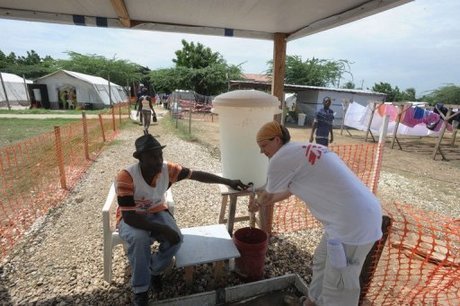
A patient has been diagnosed in Havana, days after three people died in a rare outbreak in the south-eastern town of Manzanillo
But it is not clear what the source of the cholera is.
Most of the cases were in Cuba’s south-eastern Granma province, more than 750 km (470 miles) from Havana.
Hundreds of medical professionals from that area, including nurses, have worked and continue to work with patients in Haiti, where tens of thousands of people were infected after a devastating earthquake in 2010.
For over a week doctors in Havana have been doing the rounds of their patients, checking for symptoms of cholera.
The infirm, elderly and pregnant have been prioritized.
Now tests on a 60-year-old woman, admitted to hospital on Wednesday, have confirmed that she has the disease.
As she was diagnosed early, doctors say she is in a stable condition.
Health officials said they had “all the necessary resources to provide adequate attention to patients.”
They said they had taken a series of measures, including taking samples of water and adding chlorine to purify it, to combat the outbreak.
Cholera is a bacterial infection that can cause severe diarrhea and dehydration.
The Health Ministry said the last reported cholera outbreak on the island was soon after the 1959 Revolution.
Venezuela’s President Hugo Chavez has returned to Cuba for more radiotherapy to treat a recurrence of his cancer.
Hugo Chavez announced his departure from Caracas in a Twitter message sent from the airport.
“Heading for Havana with faith in Resurrected Christ. We’ll keep living and keep winning!”
Hugo Chavez had surgery in February to remove a second tumor from his pelvic area.
The President told Venezuelans he was returning to Cuba for more treatment after an emotional plea for his life at an Easter mass.
Speaking through tears in his hometown of Barinas, Hugo Chavez asked Jesus to give him more time because he had “things left to do”.
“Give me your crown, Christ, give it to me, I will bleed, give me your cross, a hundred crosses, but give me life, because I still have things left to do for the [Venezuelan] people and for the homeland,” Hugo Chavez said during Thursday night’s mass.
He later said it had been “a spontaneous, sentimental thing” brought about by the presence of his family next to him at the mass.
“My mum gave me her hand with such tenderness, and Dad gave me his… and because of this, tears rolled down my face”, Hugo Chavez said.
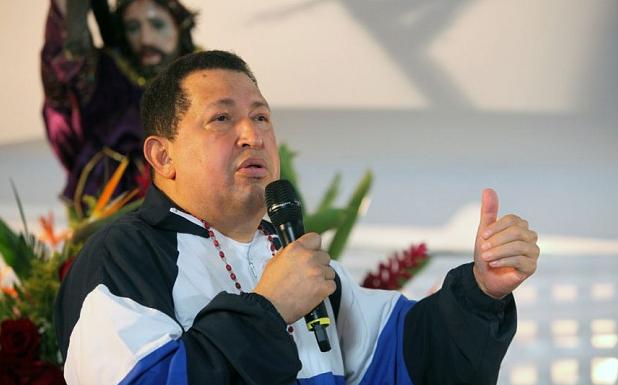
Hugo Chavez told Venezuelans he was returning to Cuba for more treatment after an emotional plea for his life at an Easter mass
The exact nature of Hugo Chavez’s cancer has not been disclosed, fuelling rumors that his health may be worse than officially stated.
Hugo Chavez, who has been in power since 1999, has said that despite his health problems he is determined to win October’s presidential election.
Last year, he had surgery and four rounds of chemotherapy in Cuba, after a baseball-sized growth was detected in his pelvic region.
After the treatment he had said he was free from cancer, only to suffer a recurrence that required surgery in February.
Just hours before leaving for Havana, the Venezuelan leader unveiled a 32.25% increase in the minimum wage, to be introduced in two stages later this year.
“In the 1980s and 90s, the minimum wage was basically frozen, then inflation went through the roof… we’ve been working on this for several weeks,” Hugo Chavez said in a televised cabinet meeting.
Venezuela inflation is currently about 25% a year.
Details were also published of telephone calls Hugo Chavez had made to the leaders of Ecuador and Bolivia, as well as to Syrian President Bashar al-Assad.
Hugo Chavez discussed the unrest in Syria, “especially the successful way the Syrian government had contained armed terrorist gangs… which were seeking in vain to impede the advance of political reforms pushed forward by the Assad government,” according to AP news agency.
At least 9,000 people have been killed, mostly by security forces, since an uprising broke out last year against Bashar al-Assad’s rule.
Venezuela’s President Hugo Chavez is returning to Cuba for further radiotherapy treatment for cancer.
Hugo Chavez had surgery in Cuba last month to remove a tumor in his pelvic area after a recurrence of cancer first treated last year.
His illness has cast doubt on his ability to campaign for re-election in October.
Hugo Chavez will coincide in Havana with Pope Benedict, who is due to fly to Cuba on Monday.
“Tonight I leave for Havana. I have decided on the recommendation of my medical team and my political team to begin the radiation treatment on Sunday,” Hugo Chavez said during a televised meeting with his cabinet.
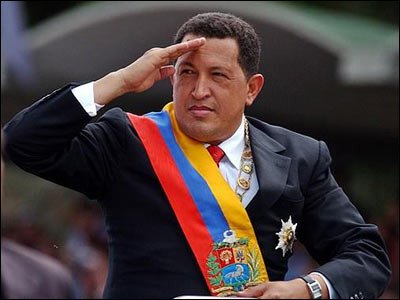
Venezuela’s President Hugo Chavez is returning to Cuba for further radiotherapy treatment for cancer
Hugo Chavez, 57, said the treatment was a complement to the surgery he had a month ago, from which he says he is recovering well.
Last year Hugo Chavez had surgery and four rounds of chemotherapy in Cuba, after a baseball-sized growth was detected in his pelvic region.
The Venezuelan leader has never revealed the exact nature of his cancer, fuelling speculation that his health may be worse than officially stated.
Hugo Chavez has told Venezuelan to ignore rumors he says are aimed at destabilizing the country.
In October’s election, he is facing a strong challenge from opposition candidate Henrique Capriles Radonski.
Hugo Chavez, who has been in power since 1999, is seeking another six-year term to continue his programme of “socialist revolution”.
 Prev123Page 3 of 3
Prev123Page 3 of 3













